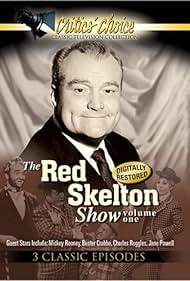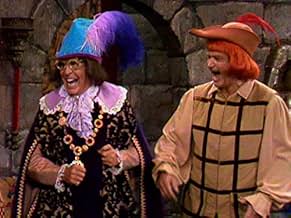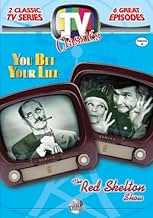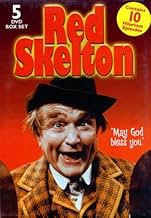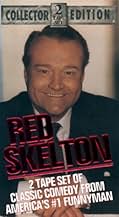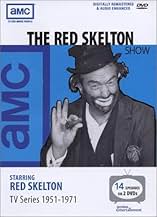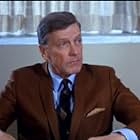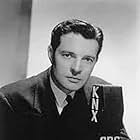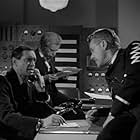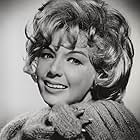VALUTAZIONE IMDb
8,1/10
1427
LA TUA VALUTAZIONE
Aggiungi una trama nella tua linguaComedian Red Skelton hosts a variety show of comedic sketches, and a range of stars, to speak to an entire generation.Comedian Red Skelton hosts a variety show of comedic sketches, and a range of stars, to speak to an entire generation.Comedian Red Skelton hosts a variety show of comedic sketches, and a range of stars, to speak to an entire generation.
- Vincitore di 2 Primetime Emmy
- 4 vittorie e 16 candidature totali
Sfoglia gli episodi
Trama
Lo sapevi?
- QuizRed Skelton had a reputation among comedy writers as being extremely difficult to work with, since he didn't like writers in general, and resented CBS for insisting that he use them on his show. He wanted to write all the sketches himself, his reasoning being that no one knew his characters as well as he did. Prior to taking the position as head writer on the show, Sherwood Schwartz, had it written into his contract with CBS that Skelton was under no circumstances allowed to discuss anything about a show's script with him before he was given it prior to taping, which often resulted in Skelton not knowing what a sketch was about, nor even what character he would be playing until shortly before airtime. That's why Skelton would often break character in the middle of a skit and turn to the audience and say something like "Don't blame me, folks, I don't write this stuff."
- ConnessioniFeatured in Blushing Bloopers (1990)
Recensione in evidenza
Red Skelton's TV show was a well-produced variety hour that had an impressively long run, largely due to the big-name guest stars who appeared opposite Red. Although I sometimes laugh at Skelton, I'm not hugely a fan of his work. Red Skelton was one of the most undisciplined performers in the history of showbiz (which is saying a lot!), and he was notorious for 'corpsing' his guest-stars: trying to make them break character and laugh. Supposedly, Skelton had a wide range of comedic characterisations, but most of them were just Red Skelton playing himself with minor changes in costume and situation. Freddie the Freeloader was Skelton playing himself as a hobo, San Fernando Red was Skelton playing himself as a con-man, Cauliflower McPugg (a real Al Capp name!) was Skelton playing himself as a boxer, George Appleby was Skelton playing himself as a henpecked husband, Willie Lump Lump was guess-who as a drunk, Sheriff Deadeye was guess-who as a cowboy, Forsooth was Skelton again as a mediaeval peasant, and so forth. I find Skelton's customary sign-off very annoying: 'Good night, and may God bless.' God bless what or whom? Why couldn't Skelton say 'God bless YOU', or 'God bless us, every one', or something that makes grammatical sense? His other famous catchphrase was 'I dood it', but in this case he doodn't.
The most original part of Red Skelton's show was the closing segment of most episodes. Called 'The Silent Spot', this featured Skelton in a wordless skit, utterly silent except for sound effects and the audience's laughter. TV TRIVIA: The guy who invented the laugh-track machine used audio recordings of Red Skelton's 'Silent Spot' segments as the source for his canned laughter: these contained no dialogue, so the inventor merely cut out the sound effects and had long audio samples of undiluted laughter. Skelton always performed his silent skits alone, sometimes abetted by stuntmen and mute bit players but without any co-star. The only time Skelton varied this formula was (fittingly enough) with guest star Harpo Marx in a World War One sketch, with Skelton as a doughboy and Harpo as a German officer sharing a dugout in No Man's Land.
The 24 September 1968 episode of Red Skelton's show had the unfortunate title 'He Who Steals My Robot Steals Trash'. This episode guest-starred Vincent Price and Boris Karloff in a prolonged spoof on horror movies. Skelton portrayed Clem Kadiddlehopper, who was (as usual) Red Skelton playing himself as a hillbilly. In the first half of the two-act skit, Vincent Price played a mad scientist in search of a brain for his robot. Guess whose brain he decides to use. Encountering farmboy Kaddidlehopper in a field (a very obvious indoor stage set), Price lures him to his lab. All the gags can be seen a mile off. When Clem's hillbilly father learns that Clem has been abducted by a mad scientist, he sadly mourns "I've lost Clem, I've lost Clem..." only to immediately become elated and rush offstage cackling "I've lost Clem! I've lost Clem!"
The second act takes place in Price's lab. It turns out he's the junior partner in a father-and-son team of mad scientists. And now here comes his father, to huge applause from the studio audience: Boris Karloff! The skit itself is unfunny, although it's pleasant to see Karloff gamely guying his own image.
After the commercial break, Karloff and Price take a bow as themselves and perform a jolly little song about their screen careers, in which Price sings the line 'I was the Fly'. It's a bit disorienting to hear him sing this; Vincent Price did indeed star in 'The Fly' but he did NOT play the title role, and he often encountered film fans who thought he HAD played that role.
I'm a fan of Karloff, but at this point (only a few months before his death) that great actor's health was so bad that his appearance is very distressing. Throughout this episode, Karloff spends his entire screen time sitting down, clearly too weak to stand. In the lab sketch, he makes his entrance (and it IS quite an entrance!) aboard a motorised chair that looks like something Blofeld might favour. The chair is extremely bulky, suggesting that Karloff's oxygen tank is stowed aboard. By this time, the lung complaint that would eventually end Karloff's life was so severe that an oxygen cylinder was always close at hand.
During the third-act musical number, Karloff and Price are both seated on a platform that mechanically trundles through the proscenium curtain. Again, it's an effective entrance, and Price's presence aboard the platform makes it less obvious that Karloff is too weak to stand.
I've seen Vincent Price on a much earlier episode of Skelton's show, from the 1950s. His hammy personality worked well with Skelton's humour. Karloff too had made at least one 1950s appearance (famously referenced in a 'Honeymooners' episode) on Skelton's show. If only Karloff and Price had appeared together opposite Skelton circa 1957, when Karloff was still comparatively healthy, that might have been a comedy skit to cherish. As it is, though, Karloff's (inappropriately) cadaverous appearance makes this guest shot a very depressing one indeed. And, given its spookfest atmosphere, I wonder why this pre-recorded episode was aired in September, rather than delaying it another month and showing it at Hallowe'en.
The most original part of Red Skelton's show was the closing segment of most episodes. Called 'The Silent Spot', this featured Skelton in a wordless skit, utterly silent except for sound effects and the audience's laughter. TV TRIVIA: The guy who invented the laugh-track machine used audio recordings of Red Skelton's 'Silent Spot' segments as the source for his canned laughter: these contained no dialogue, so the inventor merely cut out the sound effects and had long audio samples of undiluted laughter. Skelton always performed his silent skits alone, sometimes abetted by stuntmen and mute bit players but without any co-star. The only time Skelton varied this formula was (fittingly enough) with guest star Harpo Marx in a World War One sketch, with Skelton as a doughboy and Harpo as a German officer sharing a dugout in No Man's Land.
The 24 September 1968 episode of Red Skelton's show had the unfortunate title 'He Who Steals My Robot Steals Trash'. This episode guest-starred Vincent Price and Boris Karloff in a prolonged spoof on horror movies. Skelton portrayed Clem Kadiddlehopper, who was (as usual) Red Skelton playing himself as a hillbilly. In the first half of the two-act skit, Vincent Price played a mad scientist in search of a brain for his robot. Guess whose brain he decides to use. Encountering farmboy Kaddidlehopper in a field (a very obvious indoor stage set), Price lures him to his lab. All the gags can be seen a mile off. When Clem's hillbilly father learns that Clem has been abducted by a mad scientist, he sadly mourns "I've lost Clem, I've lost Clem..." only to immediately become elated and rush offstage cackling "I've lost Clem! I've lost Clem!"
The second act takes place in Price's lab. It turns out he's the junior partner in a father-and-son team of mad scientists. And now here comes his father, to huge applause from the studio audience: Boris Karloff! The skit itself is unfunny, although it's pleasant to see Karloff gamely guying his own image.
After the commercial break, Karloff and Price take a bow as themselves and perform a jolly little song about their screen careers, in which Price sings the line 'I was the Fly'. It's a bit disorienting to hear him sing this; Vincent Price did indeed star in 'The Fly' but he did NOT play the title role, and he often encountered film fans who thought he HAD played that role.
I'm a fan of Karloff, but at this point (only a few months before his death) that great actor's health was so bad that his appearance is very distressing. Throughout this episode, Karloff spends his entire screen time sitting down, clearly too weak to stand. In the lab sketch, he makes his entrance (and it IS quite an entrance!) aboard a motorised chair that looks like something Blofeld might favour. The chair is extremely bulky, suggesting that Karloff's oxygen tank is stowed aboard. By this time, the lung complaint that would eventually end Karloff's life was so severe that an oxygen cylinder was always close at hand.
During the third-act musical number, Karloff and Price are both seated on a platform that mechanically trundles through the proscenium curtain. Again, it's an effective entrance, and Price's presence aboard the platform makes it less obvious that Karloff is too weak to stand.
I've seen Vincent Price on a much earlier episode of Skelton's show, from the 1950s. His hammy personality worked well with Skelton's humour. Karloff too had made at least one 1950s appearance (famously referenced in a 'Honeymooners' episode) on Skelton's show. If only Karloff and Price had appeared together opposite Skelton circa 1957, when Karloff was still comparatively healthy, that might have been a comedy skit to cherish. As it is, though, Karloff's (inappropriately) cadaverous appearance makes this guest shot a very depressing one indeed. And, given its spookfest atmosphere, I wonder why this pre-recorded episode was aired in September, rather than delaying it another month and showing it at Hallowe'en.
- F Gwynplaine MacIntyre
- 22 ott 2004
- Permalink
I più visti
Accedi per valutare e creare un elenco di titoli salvati per ottenere consigli personalizzati
- How many seasons does The Red Skelton Hour have?Powered by Alexa
Dettagli
- Data di uscita
- Paesi di origine
- Lingua
- Celebre anche come
- The Red Skelton Hour
- Luoghi delle riprese
- Aziende produttrici
- Vedi altri crediti dell’azienda su IMDbPro
- Tempo di esecuzione1 ora
- Mix di suoni
- Proporzioni
- 1.33 : 1
Contribuisci a questa pagina
Suggerisci una modifica o aggiungi i contenuti mancanti

Divario superiore
By what name was The Red Skelton Show (1951) officially released in India in English?
Rispondi